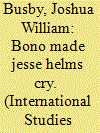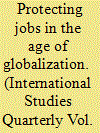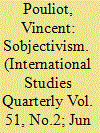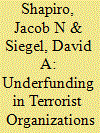|
|
|
Sort Order |
|
|
|
Items / Page
|
|
|
|
|
|
|
| Srl | Item |
| 1 |
ID:
078283


|
|
|
|
|
| Publication |
2007.
|
| Summary/Abstract |
Do states and decision-makers ever act for moral reasons? And if they do, is it only when it is convenient or relatively costless for them to do so? A number of advocacy movements-on developing country debt relief, climate change, landmines, and other issues-emerged in the 1990s to ask decision-makers to make foreign policy decisions on that basis. The primary advocates were motivated not by their own material interests but broader notions of right and wrong. What contributes to the domestic acceptance of these moral commitments? Why do some advocacy efforts succeed where others fail? Through a case study of the Jubilee 2000 campaign for developing country debt relief, this article offers an account of persuasion based on strategic framing by advocates to get the attention of decision-makers. Such strategic but not narrowly self-interested activity allows weak actors to leverage existing value and/or ideational traditions to build broader political coalitions. This article, through case studies of debt relief in the United States and Japan, also links the emerging literature on strategic framing to the domestic institutional context and the ways veto players or "policy gatekeepers" evaluate trade-offs between costs and values.
|
|
|
|
|
|
|
|
|
|
|
|
|
|
|
|
| 2 |
ID:
078284


|
|
|
|
|
| Publication |
2007.
|
| Summary/Abstract |
Research on the diversionary use of force has burgeoned in recent years, but the literature remains divided. This paper attempts to reconcile extant findings by advancing a new theoretical framework for diversionary force centered on the agenda-setting literature. It expands the conventional conception of diversionary behavior and distinguishes the benevolent use of force over low politics issues (which we term socioeconomic interventions, SEI) from belligerent force used over high politics issues (which we term politico-strategic interventions, PSI). This expansion also refines our understanding of strategic conflict avoidance (SCA). Using Zero-Inflated Poisson (ZIP) regression on 140 countries from 1950 to 1996, we find that democracies and mixed regimes tend to use SEI for diversion even though strategic conflict avoidance does not prevent them from using PSI. We further find that autocracies do not externalize their internal problems with either type of armed force and that, surprisingly, strategic conflict avoidance may constrain autocracies suffering economic decline. These outcomes suggest that our theory has utility and that research on both diversion and SCA would benefit from further theoretical refinement.
|
|
|
|
|
|
|
|
|
|
|
|
|
|
|
|
| 3 |
ID:
078289


|
|
|
|
|
| Publication |
2007.
|
| Summary/Abstract |
Mainstream research on political violence has traditionally paid attention to the analysis of wars, guerrilla warfare, and terrorism techniques wherein the existence of organizations makes clear the causal path between political demands and the triggering of violence. The absence of organizations in diffused forms of violence rendered the link between violence and politics more difficult. However, in the last decade research on riots has convincingly shown that this type of nonorganizationally based violence follows strategic patterns of targeting, timing, and spatial spread. By building from those findings, I focus on street violence (SV). I contend that explanations of SV based on its more impressionistic traits (just as a mechanical response to socioeconomic deprivation) fall short of being the whole story. Rather, SV seems to be triggered in settings where actors have political benefits to reap. Concretely, if we look at the Spanish Basque Country during 1996-2000, a region where SV became a persistent type of nonorganizationally based violence, it took root more in towns where the level of polarization between groups in conflict was higher. That finding fits analytical evidence from the Basque conflict as well as anecdotal evidence from other enduring conflicts all over the world.
|
|
|
|
|
|
|
|
|
|
|
|
|
|
|
|
| 4 |
ID:
078294


|
|
|
|
|
| Publication |
2007.
|
| Summary/Abstract |
Current research suggests that changes in societal demands or in political institutions propelled the far-reaching reduction of American external trade barriers since the mid-1930s, yet is unable to account for the exact pattern or timing of trade liberalization. I argue instead that exporters lobby more against losses than in favor of gains of foreign market access. Whenever foreign countries inhibit access to their markets by establishing a discriminatory trading arrangement, negatively affected exporters mobilize in defense of their interests. This lobbying then prompts excluded countries' governments to engage in policies aimed at the protection of exporter interests. Applying this argument to U.S. trade policies from the 1930s to the 1960s, I demonstrate that American exporters repeatedly mobilized in response to discrimination in Europe. The resulting peaks in exporter mobilization explain the passage of the important trade bills known as the Reciprocal Trade Agreements Act (1934) and Trade Expansion Act (1962).
|
|
|
|
|
|
|
|
|
|
|
|
|
|
|
|
| 5 |
ID:
078295


|
|
|
|
|
| Publication |
2007.
|
| Summary/Abstract |
The literature on democratization and authoritarian survival has rightfully studied the role external forces play in such processes. These external actors and structural constraints are said to be especially substantial when dealing with small and poor authoritarian states. Although this literature acknowledges that small states are not entirely powerless when confronting hegemonic external forces, little effort has been made to refine and specify the role they play and the actions they undertake to engage international democratization pressures. This paper addresses this lacuna by using the framing approach and the concept of "extraversion" to analyze the process by which weak African authoritarian states draw on and change the representations that Western powers hold about them. These representations provide a specific lens through which Western governments and experts look at political dynamics in developing countries, and eventually shape policies toward these countries. This paper analyzes how two small authoritarian African regimes, Guinea and Mauritania, have enacted a series of performances such as the arrests of alleged "Islamists,""warlords," and other transnational "subversive threats," thereby framing their domestic and foreign policies in ways that can resonate with hegemonic international discourses, seeking to obtain either more support from Western states or to lower their democratization pressure
|
|
|
|
|
|
|
|
|
|
|
|
|
|
|
|
| 6 |
ID:
078285


|
|
|
|
|
| Publication |
2007.
|
| Summary/Abstract |
The relationship between economic openness and welfare policies has become increasingly important to policy makers. While scholars have tended to examine conditions under which budgets for social welfare programs ebb and flow along with countries' exposure to trade, they have overlooked how governments may compensate domestic labor by subsidizing their employers. To explicitly address the issue of instrument choice, we examine the relative salience of social welfare expenditures to industrial subsidies in a panel of 16 OECD countries from 1980 to 1995. Our results suggest that the relative budgetary salience of social welfare to industrial subsidies is influenced by the interplay between governmental partisan gravity and changes in imports. Unlike Right governments, Left governments tend to favor indirect compensation via industrial subsidies in the wake of negative, zero or moderate increases in imports. Faced with sharp increases in imports, Left governments switch their preferences to compensating workers via more direct and visible policies, namely social welfare
|
|
|
|
|
|
|
|
|
|
|
|
|
|
|
|
| 7 |
ID:
078287


|
|
|
|
|
| Publication |
2007.
|
| Summary/Abstract |
What explains the level of violence during civil wars? In this paper, we argue that the size of the ruling coalition is a critical determinant of the severity of conflict. To maintain control over patronage, elites will fight to ward off challengers. The degree to which they use coercion hinges upon the level of private benefits they receive, which is in turn determined by coalition size. Further, we expect democracies to be more constrained in their use of force due to larger government coalitions and constraints on power. To proxy for coalition size, we use new data on the ethnic affiliation of heads of state. An empirical analysis of over 200 armed civil conflicts reveals that conflicts involving smaller ruling coalitions yield a greater number of deaths
|
|
|
|
|
|
|
|
|
|
|
|
|
|
|
|
| 8 |
ID:
078286


|
|
|
|
|
| Publication |
2007.
|
| Summary/Abstract |
This article outlines a "sobjectivist" methodology that is specifically geared toward the constructivist style of reasoning. The main argument is that constructivist inquiries need to develop not only objectified (or experience-distant) but also subjective (experience-near) knowledge about social and international life. This requirement derives from the fact that constructivism is a postfoundationalist style of reasoning which emphasizes the mutually constitutive dialectics between the social construction of knowledge and the construction of social reality. By implication, a constructivist methodology should be inductive, interpretive, and historical. The methodical practice of sobjectivism follows a three-step logic from the recovery of subjective meanings to their objectification thanks to contextualization and historicization. A brief discussion of the security-community research program illustrates what sobjectivism looks like in practice. Overall, not only does the development of a consistent methodology systematize the practice of constructivist research, it also fosters engagement and dialog with other international relations approaches. By clarifying where constructivism falls on issues of validity, falsifiability, and generalizability, this article intends to enhance mutual legibility among competing methodologies.
|
|
|
|
|
|
|
|
|
|
|
|
|
|
|
|
| 9 |
ID:
078288


|
|
|
|
|
| Publication |
2007.
|
| Summary/Abstract |
A review of international terrorist activity reveals a pattern of financially strapped operatives working for organizations that seem to have plenty of money. To explain this observation, and to examine when restricting terrorists' funds will reduce their lethality, we model a hierarchical terror organization in which leaders delegate financial and logistical tasks to middlemen, but cannot perfectly monitor them for security reasons. These middlemen do not always share their leaders' interests: the temptation exists to skim funds from financial transactions. When middlemen are sufficiently greedy and organizations suffer from sufficiently strong budget constraints, leaders will not fund attacks because the costs of skimming are too great. Using general functional forms, we find important nonlinearities in terrorists' responses to government counter-terrorism. Restricting terrorists' funds may be ineffective until a critical threshold is reached, at which point cooperation within terrorist organizations begins to break down and further government actions have a disproportionately large impact
|
|
|
|
|
|
|
|
|
|
|
|
|
|
|
|
|
|
|
|
|